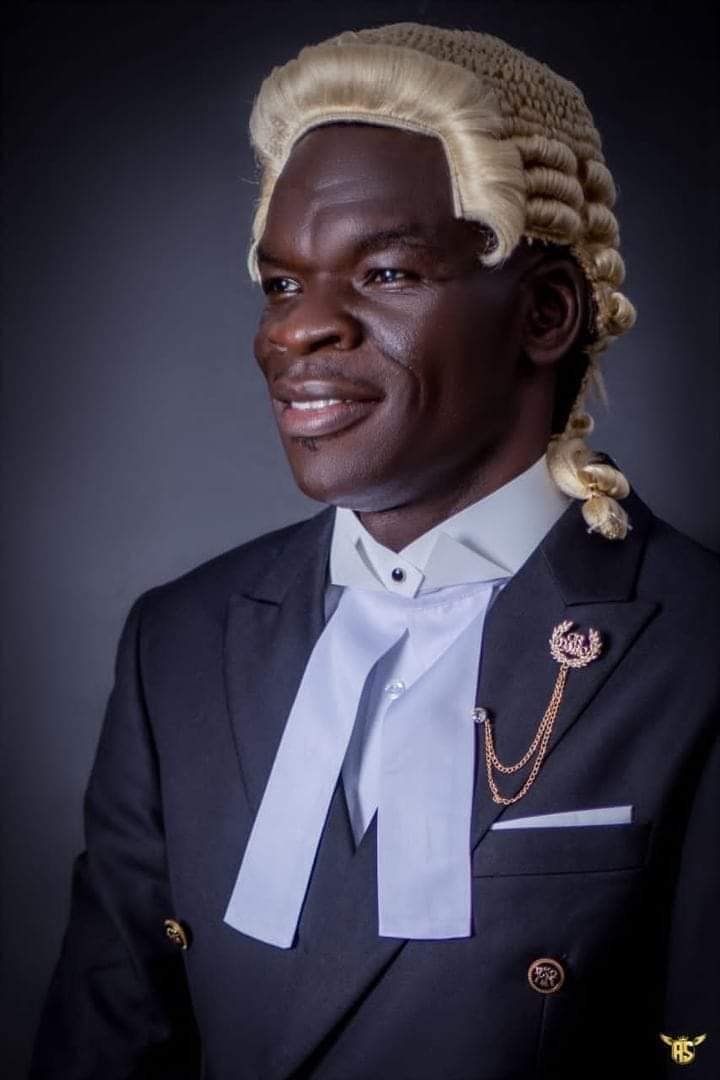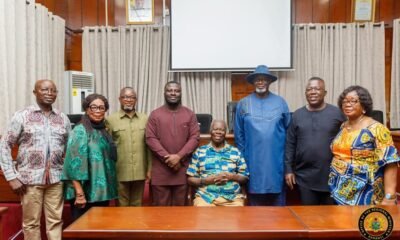Profile
School Feeding Programme ensuring quality, transparency – Mrs. Gertrude Quashigah
With expertise in food production, processing, preservation and packaging, Mrs. Gertrude Esi Quashigah continues to set remarkable standards as one of the torchbearers in the food and beverage industry.
She had contributed her quota and excelled as founder and manager of a successful family business for about two decades and is determined to do more as the leader of the Ghana National School Feeding Programme (GNSFP).
The appointment of Mrs. Quashigah as National Coordinator of the GNSFP in 2017 made her the first female National Coordinator of the programme.
Although the programme which seeks to provide children in public primary schools with one hot meal every school day has recorded some successes, Mrs. Quashigah says she would resolve existing challenges and transform the programme to provide the best to beneficiaries.
In a recent interaction with The Spectator, she touched on aspects of her life and career, indicating a clear plan of maintaining quality and transparency under her leadership.
Background
Mrs. Quashigah is the Founder and Chief Executive Officer of Ambar Quality Foods Limited.
Born February 1, 1960, at Dzelukope in the Keta Municipality of the Volta Region, she was married to the late Major Courage E. K. Quashigah, a former Minister of Health and Agriculture in the Kufour administration.
She attended Dzelukope Roman Catholic School before proceeding to Keta Secondary School where she studied Literature in English, Food Science and Nutrition.
Prior to settling on her food production and packaging business, she took up other professional courses in food production and management at different institutions, including the National Vocational Training Institute (NVTI), Empretec Ghana, Pegados Cakes & Pastries Catering School, among others.
Experience
The 61-year-old is also the Founder and Executive Director of Healthy Living Foundation and once worked with Unilever and Nestle Ghana Limited as a distributor.
She had provided quality catering and auxiliary services at events hosted by private and public institutions in the country. As an advocate of healthy living, she had trained women in the food industry on Effective Management and Hygienic Handling of Food while managing her own business.
These and other track record, she believes, have provided a solid foundation for bringing the needed transformation and innovation to her current position as Head of the School Feeding Programme.
“I believe in managerial ethics and working hard to serve my country with purpose. My vision is to enhance the school feeding programme and I am working hard to continue the legacy of a principled man who had diligently served his country in all aspects of his life,” she noted.
Operations
Touching on some progress and achievements, the National Coordinator said that the GNSFP continued to provide jobs for thousands of caterers and cooks working in over 10,000 basic schools in all 260 districts of the country and was on course to digitise its records and operations.
She said that the institution, in addition to building the capacity of personnel, was collaborating with development partners and stakeholders to ensure more transparency in key target areas.
Mrs. Quashigah admitted that the programme had, over the years, relied on manual payment systems and was, therefore, taking steps to introduce new systems that could “address about 90 per cent of the challenges of the programme.”
“There are huge numbers under the programme hence the need to police the system more effectively to enable the programme to operate satisfactorily within its limited budget,” she stressed and maintained that food, just like medicine, was essential for human survival hence the need to make essential nutrients available in every diet.
She said it was her contribution to create conducive and hygienic spaces for cooks and kitchen staff under the programme, adding that the programme had provided training to caterers on alternative sources of protein such as soya and eggs to improve the quality of food served in schools.
Leadership
Soft-spoken Mrs. Quashigah said her leadership was receptive of constructive criticism, open to new ideas, and would continue to maintain cordial relationship with stakeholders, irrespective of challenges which may arise.
She called for support from individuals, private and corporate bodies and urged the public to continue providing relevant feedback and offer productive ideas.
“The School Feeding programme supports the overall development of children of school going age and it is important that all hands are on deck to help attain the objectives of the programme.
“Our doors are opened and we will continue to work to ensure that school children are well catered for while we provide the needed support for women and introduce a new phase of the programme,” she said.
Recognition
Mrs. Quashigah had received the Ghana Star Award for Packaging Excellence and was recognised by the Ghana Association of Women Entrepreneurs for her women empowerment efforts.
She is the patron of Ghana Chefs Associations and had travelled across the country to promote made in Ghana dishes. She won gold when she led a team of Ghanaian Chefs to Info Chef Competition in South Africa in 2005.
She played a significant role during the 2008 Africa Cup of Nations in Accra, and catered for the Ghana National Supporters Union during the World Cup in South Africa and Brazil in 2010 and 2014 respectively.
Advice
As a staunch Catholic, she listens to gospel music and spends time with her children and grandchildren. She is, therefore, advising young people to continue to acquire knowledge and take up responsibility when duty calls.
By Ernest Nutsugah
Profile
Prisca Abah: Ghana’s modelling powerhouse

Ghanaian model, philanthropist and advocate, Prisca Abah, who is known for her contributions to the fashion industry, is strutting her stuff on higher levels.
She was recently selected as one of the models for the Big8 Girls Project, an initiative by Clinton Samuel to celebrate influential African models.
The project consisted of three episodes: the Bio Shoot which highlighted Abah’s professionalism through a corporate-themed photoshoot; Afrodeity which focused on showcasing her confidence and artistry, celebrating the African divine feminine and royalty which presented Abah as a symbol of African cultural pride, embodying strength and elegance.

The Big8 concept, produced by Clinton Samuel, intentionally highlights and celebrates the strongest and most influential models on the African continent, congratulating their steadfastness and contributions to the African fashion industry, even as they grind and win in other aspects of life.
The Big8 sets hierarchy and high standards in the African fashion and modelling industry, crowning eight of them with the ‘Top Model’ status as the leading female models in Ghana at the moment.
“Working with these fiery women will surely ignite more creative minds and stir the pot of positive competition,” said Clinton.

Abah’s early life and career
Prisca Abah began her modelling career in 2013, achieving her first notable milestone in 2014 with an editorial shoot for 5-Star International Modelling Agency. In 2015, she made her runway debut at the Ghana Fashion Awards.
From 2016 to 2018, Abah participated in major African fashion events such as Glitz Africa Fashion Week, Mercedes-Benz Fashion Week in Johannesburg, and Rhythms on the Runway.
During this period, she received accolades, including the “Best Female Model of the Year” and spoke as a UN Ambassador for Sustainable Development Goal 12 at the Sustainable Rice Platform Conference.
International recognition and pageantry
In 2022, Abah expanded her reach by entering the pageantry world. She placed as the first runner- up at the Beauty of Africa International Pageant and represented Ghana at the Miss Globe World Finals, where she earned the title of Miss Globe Africa 2022.

Philanthropy
Abah founded the Palins Foundation, a non-profit organisation, aimed at empowering women and youth through initiatives in education, skills training, and personal development.
Awards and collaborations
In 2023, Abah received the Best Model of the Year award at the Time Ghana Arts and Entertainment Awards. She has collaborated with leading designers such as Charlotte Prive and Ejiro Amos Tafiri, further solidifying her influence in African fashion.
Legacy
Prisca Abah is recognised not only for her contributions to the fashion industry but also for her philanthropic efforts. Her journey serves as an inspiration to young Africans, encouraging them to pursue their dreams while giving back to society.
By Edem Mensah Tsortorme
Profile
Juventus Duorinaah, Ghana’s first deaf Lawyer

In a landmark moment for Ghana’s legal landscape, Juventus Duorinaah Esq., has etched his name in history as the country’s first lawyer with a hearing impairment.
His journey from a humble background to breaking barriers in the legal profession serves as a powerful inspiration for countless individuals in the disability community, proving that determination and resilience can defy societal expectations and create pathways to success.
For Juventus, the recognition as Ghana’s first deaf lawyer feels surreal.
“It feels like a dream,” he reflects, acknowledging the stereotypes surrounding deafness and the humble background from which he hails.
Juventus’ passion for law sparked in 2008 while seeking admission to the University of Ghana (UG). Although he initially faced challenges due to the nature of the application process, the help of his older brother and his determined spirit led him to pursue a Bachelor of Arts degree in 2012, followed by a Master of Laws at Cardiff University in 2014.
His passion for the study of law became highly intense when he had to study alongside qualified lawyers from several jurisdictions, even though he did not have a legal background. Here, he faced the unique challenge of studying without sign language interpreters, relying instead on a palantypist to transcribe lectures.
Juventus’ role model was his professor and mentor, Professor Luke Clement, who profoundly inspired him in shaping his understanding of law and human rights.
He remembers Prof. Thomas Stephens from the University of Ghana School Of Law, who inspired him with his way of dressing, in-depth knowledge of the law and engagement with students.
He recounts the enormous challenges he encountered during the COVID-19 pandemic in 2020, when lectures moved online, and Dr Stephen’s tremendous support to ensure things moved quickly and smoothly for him.
“I also had the chance to have a few classes with the Dean himself, Prof. Raymond Atuguba. He taught the course such that some of us never felt scared as other lecturers made the course,’ he recalled.
Juventu’s academic journey was fraught with challenges, particularly in communication.
The year 2007 was the last time he studied with deaf peers. He was often the only deaf person in his classes throughout the following years of his education, which made interaction with peers difficult.
Despite these hurdles, he remained high-spirited, studying late into the night and seeking help from kind classmates when necessary.
Reflecting on his academic experience at UG, he connected his affection for the university to his older brother, who is also an alumnus. He felt inspired to be a student of the premier university, saying he would choose the University of Ghana any time, any day, if given the chance to further his studies or work.
The University Of Ghana School Of Law, along with its Dean, Professor Raymond Atuguba, the Director of Legal Education of the Ghana School of Law, Yaw Bramiah Oppong, and his capable team, including the Registrar and Deputy Registrar of the Ghana School of Law and the Office for Students with Special Needs (UG), made significant contributions to his journey.
Prof. Atuguba acknowledged Juventus’ achievement as evidence of the university’s commitment to Diversity, Equity and Inclusion.
Commenting on how the school accommodated his special needs, Prof. Atugugba explained that ‘In the case of Juventus, we worked closely with him to understand and address his special needs, ensuring he had access to the teaching and learning resources in the appropriate formats that would support his academic journey.
Professor Atuguba noted that Juventus’s journey is just beginning, and the future holds promise for him and the many lives he aims to touch along the way.
Juventus’s close friend, Ida Esi McOwusu Esq., described her first encounter with Juventus as ‘intriguing.’ “My first meeting with Juventus was in class, where he sat right in front of me in first year,” Ida reveals. She was intrigued and wanted to find out more about him, especially how Juventus navigated his way to this level. “I got closer and we became friends from there,” she remarked.
Mr Francis Kweku Essel, Juventus’ interpreter, shed light on the primary challenges he faced in carrying out his job, particularly the complex nature of legal terminology and concepts. This validates Ida’s comment on the interpreters’ lack of legal background as a challenge Lawyer Duorinaah encountred.
Juventus dreams of becoming a judge and aims to enhance justice delivery while serving as a role model for young people with disabilities.
He is currently mentoring a group of young deaf students interested in pursuing law, hoping to pave the way for future generations. What’s next for Lawyer Juventus? His next step is to complete his pupilage, after which he can decide further his legal career.







